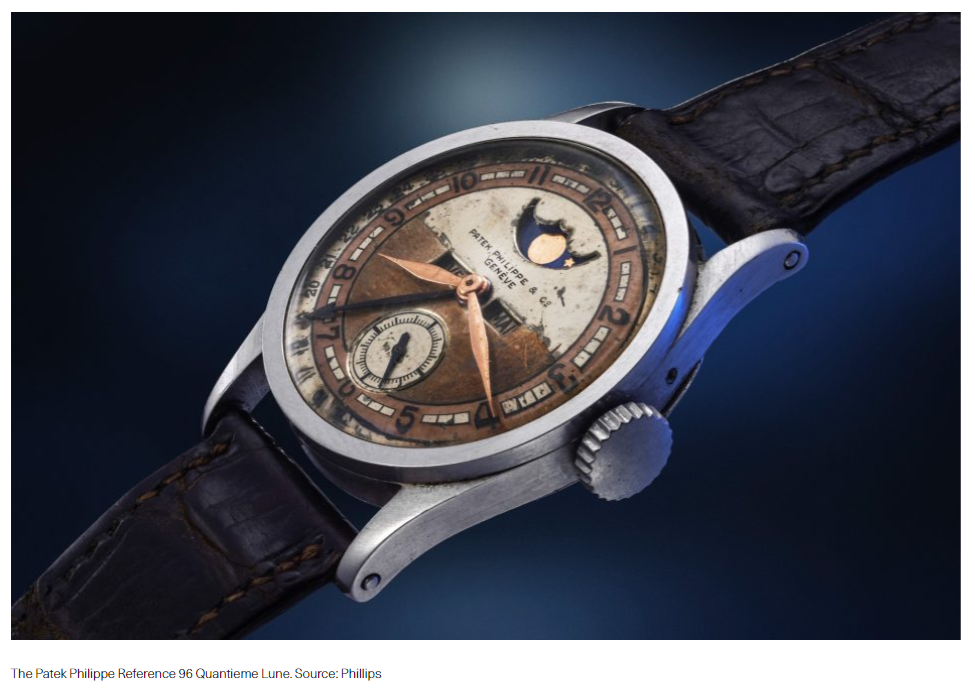An auction of the last Chinese Qing Emperor Aisin-Gioro Puyi Patek Philippe watch
Posted by Jean-Luc Andriot on Monday, April 24th, 2023 at 8:44am.

Aisin-Gioro Puyi left the timepiece and other treasures to his Russian translator, a companion during his confinement in Siberia by the Soviets.
It will be auctioned by Phillips in Association with Bacs & Russo.
Aisin-Gioro Puyi, also known as Pu Yi, was the last emperor of China's Qing dynasty. He was born on February 7, 1906, in the Forbidden City in Beijing, the capital of China. He was the second son of Prince Chun, who was a member of the imperial family and the younger brother of Emperor Guangxu.
Pu Yi's birth was a significant event in the Qing dynasty, as it had been nearly 40 years since the last emperor was born. He was named heir to the throne and was raised in the luxurious surroundings of the Forbidden City. However, his early years were overshadowed by political turmoil and instability in China.
When Pu Yi was just two years old, his uncle, Emperor Guangxu, died under mysterious circumstances. The Dowager Empress Cixi, who was the most powerful figure in the imperial court, selected Pu Yi to be the next emperor. He was officially crowned at the age of three, making him the youngest emperor in Chinese history.
Pu Yi's reign was short-lived and tumultuous. The Qing dynasty was in decline, and China was facing internal unrest and external pressure from foreign powers. In 1911, a revolution led by Sun Yat-sen overthrew the Qing dynasty, and Pu Yi was forced to abdicate. He was just five years old at the time.
After his abdication, Pu Yi was allowed to remain in the Forbidden City, but he was no longer an emperor. He was effectively a prisoner, surrounded by eunuchs and court officials who were loyal to the new republican government. He was allowed to continue his studies, but his life was highly restricted, and he was cut off from the outside world.
In 1924, Pu Yi was finally allowed to leave the Forbidden City and was sent to live in Tianjin, a port city in northern China. There, he began to learn about the world beyond China's borders. He became friends with a Japanese gardener, who introduced him to Japanese culture and taught him how to speak Japanese. Pu Yi also studied English, French, and German, and became an avid reader of Western literature.
In 1932, the Japanese invaded China's northeastern provinces and established a puppet state called Manchukuo. They invited Pu Yi to become its emperor, and he accepted the offer. He returned to the Forbidden City, where he was once again crowned emperor.
However, Pu Yi's reign in Manchukuo was short-lived and marked by controversy. He was widely seen as a Japanese puppet, and his attempts to assert his independence from his Japanese overlords were met with suspicion and hostility. Pu Yi was eventually forced to abdicate again in 1945, following Japan's defeat in World War II.
After the war, Pu Yi was captured by Soviet forces and held prisoner for five years. He was then transferred to the custody of the Chinese Communist Party, which initially treated him with suspicion and hostility. However, as Pu Yi became more familiar with Communist ideology, he began to see the potential for a new kind of China, one that was free from the corruption and inequality that had plagued the Qing dynasty.
Pu Yi eventually renounced his imperial title and became a supporter of the Communist Party. He was allowed to live in Beijing and worked as a gardener and librarian. He married a woman named Li Shuxian, and they had a daughter together.
Pu Yi died on October 17, 1967, at the age of 61. He had been suffering from kidney disease for several years, and his health had been deteriorating. His death marked the end of an era in Chinese history, as he was the last surviving member of the Qing dynasty.